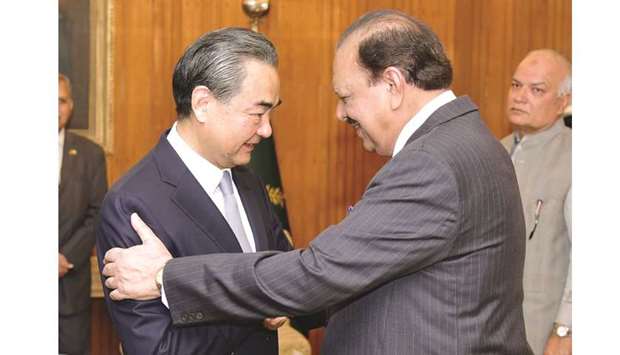Pakistan has deployed a 15,000-strong military force to protect Chinese nationals working on energy and infrastructure projects in the country, the president said yesterday, after the abduction of a Chinese couple raised safety concerns.
President Mamnoon Hussain told visiting Chinese Foreign Minister Wang Yi in Islamabad that the protection of Chinese citizens working in Pakistan was the “top priority” of the government, according to a statement issued by the presidency.
Later Chinese Foreign Minister Wang Yi and Pakistani Adviser to the Prime Minister on National Security and Foreign Affairs Sartaj Aziz attended a press briefing at the Nor Khan Air base in Rawalpindi.
Beijing is investing around $50bn in its South Asian neighbour as part of a plan unveiled in 2015 to link its far-western Xinjiang region to Gwadar port in Baluchistan with a series of infrastructure, power and transport upgrades.
But fears over safety arose last month when two Chinese workers were abducted in Quetta, the capital of the southwestern Baluchistan province, which is at the heart of the China Pakistan Economic Corridor (CPEC) project but racked by separatist and Islamist insurgencies.
Authorities were going to all possible efforts to arrest those responsible for kidnapping, Hussain said.
China has stated it will co-operate with Pakistani authorities to investigate whether the two Chinese citizens – who were allegedly killed by the Islamic State group in the country – had been illegally preaching.
So far there has been no official confirmation of the Chinese pair’s fate.
Pakistan has been battling Islamist and nationalist insurgencies in mineral-rich Baluchistan since 2004, with hundreds of soldiers and militants killed in the fighting.
The IS group has been making inroads in the country through alliances with local militant outfits, although its presence is generally downplayed by the government.
In a related development China has urged Afghanistan and Pakistan to improve relations and establish a crisis prevention and management mechanism, the Chinese foreign ministry said.
Foreign Minister Wang Yi met Afghan President Ashraf Ghani in Kabul on Saturday and said a three-way conference mechanism involving the two countries and China could promote dialogue and co-operation, the ministry said in a statement on its website.
“China sincerely wishes for Afghanistan and Pakistan to improve relations, rebuild mutual trust strengthen co-operation, achieve mutual safety and mutually development,” Wang said, according to the statement.
“As Afghanistan and Pakistan’s mutual friend, China encourages them to establish a crisis prevention and management mechanism as soon as possible, to properly deal with any kind of sudden occurrence.”
Wang was visiting Pakistan on the weekend.
Neither Afghan nor Pakistani officials were available for comment.
Afghanistan and Pakistan have been uneasy neighbours ever since Pakistan’s independence in 1947.
Their ties have been poisoned in recent years by Afghan accusations that Pakistan is supporting Taliban insurgents fighting the US-backed Kabul in order to limit the influence of its old rival, India, in Afghanistan.
Pakistan denies that and says it wants to see a peaceful, stable Afghanistan.
Several people were killed when Afghanistan and Pakistan border troops exchanged fire for hours in early May.
As a result, a major border crossing was closed for more than three weeks.
China is also worried about the spread of Islamist militancy from lawless ethnic Pashtun lands along Pakistan’s border with Afghanistan, in particular the danger of members of its Uighur Muslim minority being radicalised there.
In Pakistan on Saturday, Wang said counter-terrorism was an important part of China’s relations with Pakistan and he thanked Pakistan “for its firm support for China’s fight against the violent terrorist group the ‘East Turkistan Islamic Movement’,” China’s Xinhua news agency reported.
China says the East Turkistan Islamic Movement is a violent Uighur separatist group with links to militants in South Asia.

Pakistan President Mamnoon Hussain shakes hands with Chinese Foreign Minister Wang Yi upon his arrival at President House in Islamabad yesterday.
